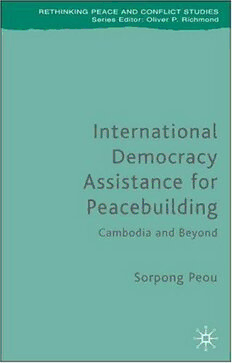
International Democracy Assistance for Peacebuilding: The Cambodian Experience (Rethinking Peace and Conflict Studies) PDF
272 Pages·2007·0.864 MB·English
Most books are stored in the elastic cloud where traffic is expensive. For this reason, we have a limit on daily download.
Preview International Democracy Assistance for Peacebuilding: The Cambodian Experience (Rethinking Peace and Conflict Studies)
Description:
This book seeks to explain why international donors may succeed in putting war-torn countries on the path of democratic transition and negative peace, but fail to consolidate the gains they make. Cambodia provides an excellent example for international peace builders: the donor community spent billions of dollars rebuilding the country between 1992 and 2006, but democracy remains unconsolidated and may even be receding towards "electoral dictatorship." Critical of neo-institutionalism, but sympathetic to historical and normative institutionalism, this book advances a theory called "complex realist institutionalism" to explain the limits of international democracy assistance to post-war societies.
See more
The list of books you might like
Most books are stored in the elastic cloud where traffic is expensive. For this reason, we have a limit on daily download.
